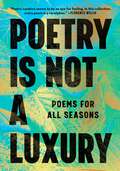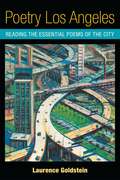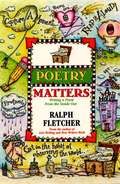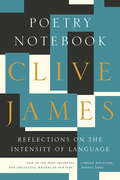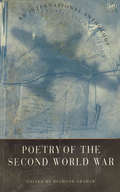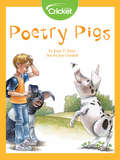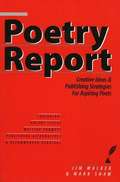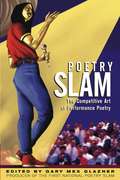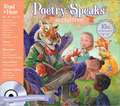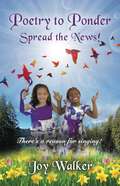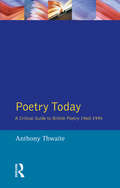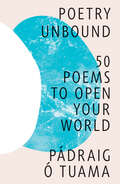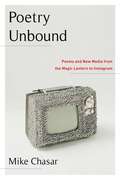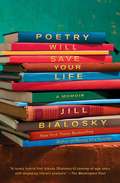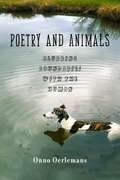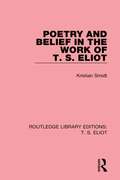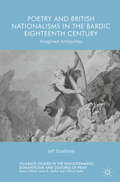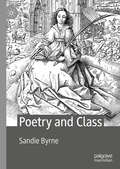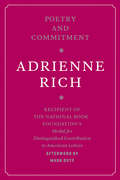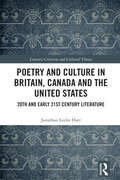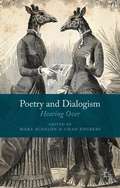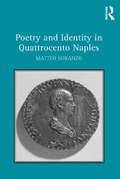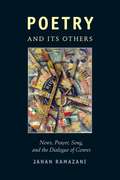- Table View
- List View
Poetry Is Not a Luxury: Poems for All Seasons
by AnonymousFrom the creator of the beloved @PoetryIsNotaLuxury Instagram account, a gorgeously wrought poetry anthology that is a gift and a guide for readers through every season of life.Inspired by writer and philosopher Audre Lorde&’s famous claim: &“Poetry is not a luxury,&” this anthology proves the vitality of poetry as a crucial source of inspiration, comfort, and delight. In a first section, &“Summer,&” you&’ll find lush landscapes and love poems for weddings and anniversaries, alongside poems on travel, protest, and expressions of sheer joy and exhilaration. &“Autumn&” ushers in nostalgic poems about home and family and friendship, fall leaves, nesting and gratitude. You may turn to &“Winter&” should you require a poem for mourning, some lyrics for loneliness, or an ode to comfort. Rounding out a year&’s worth of verse is &“Spring,&” in which you&’ll discover celebratory poems, in the form of praise for rain and flowers, new beginnings, and all that the future might hold. Each poem within has been chosen from centuries of verse from around the world, with an emphasis on living poets. Friends old and new await, with selections from Rita Dove, Victoria Chang, Ross Gay, Naomi Shihab Nye, C.D. Wright, Eileen Myles, Ada Limón, Ilya Kaminsky, Jos Charles, and more. From love poems to elegies, from the heights of new love to the furrows of anxiety, from special occasions to a morning pick-me-up, there is something here for longtime poetry lovers and novices, in any season of need.
Poetry Los Angeles: Reading The Essential Poems Of The City
by Laurence GoldsteinIs there such a thing as Los Angeles poetry? How do we assess a poem about a city as elusive of identity as Los Angeles? What features do poems about this unique urban landscape of diverse peoples and terrains have in common? Poetry Los Angeles is the first book to gather and analyze poems about sites as different as Hollywood, Santa Monica and Venice beaches, the freeways, downtown, South Central and East L. A. Laurence Goldstein presents original commentary on six decades of poets who have contributed to the iconography and poetics of Los Angeles literature, including Elizabeth Alexander, Jimmy Santiago Baca, Dorothy Barresi, Victoria Chang, Wanda Coleman, Dana Gioia, Joy Harjo, James Harms, Robert Hass, Eloise Klein Healy, Garrett Hongo, Suzanne Lummis, Paul Monette, Harryette Mullen, Carol Muske-Dukes, Frederick Seidel, Gary Soto, Timothy Steele, Diane Wakoski, Derek Walcott, and Charles Harper Webb. Forty poems are reproduced in their entirety. One chapter is devoted to Charles Bukowski, the celebrity face of the city's poetry. Other chapters discuss the ways that poets explore "Interiors" and "Exteriors" throughout the cityscape. Goldstein also provides ample connections to the novels, films, art, and politics of Southern California. In clear prose, Poetry Los Angeles examines the strategies by which poets make significant places meaningful and memorable to readers of every region of the U. S. and elsewhere.
Poetry Matters: Writing a Poem from the Inside Out
by Ralph FletcherFrom the book: Maybe you've heard before that poetry is magic, and it made you roll your eyes, but I believe it's true. Poetry matters. At the most important moments, when everyone else is silent, poetry rises to speak. I wrote this book to help you write poems and to give practical ideas for making your poems sound the way you want them to sound. We're not going to smash poems up into the tiniest pieces. This book is about writing poetry, not analyzing it. I want this book to help you have more wonderful moments in the poetry you write. I want you to feel the power of poetry. It's my hope that through this book you will discover lots of ways to make your poems shine, sing and soar.
Poetry Notebook: Reflections on the Intensity of Language
by Clive James"Clive James is more or less the only living poet who manages to be both entertaining and moving." --Edward Mendelson, Columbia University Clive James is one of our finest critics and best-beloved cultural voices. He is also a prize-winning poet. Since he was first enthralled by the mysterious power of poetry, he has been a dedicated student. In fact, for him, poetry has been nothing less than the occupation of his lifetime, and in this book he presents a distillation of all he's learned about the art form that matters to him most. With his customary wit, delightfully lucid prose style and wide-ranging knowledge, Clive James explains the difference between the innocuous stuff so prevalent today and a real poem: the latter being a work of unity that insists on being heard entire and threatens never to leave the memory. A committed formalist and an astute commentator, James examines the poems and legacies of a panorama of twentieth-century poets, from Hart Crane to Ezra Pound, from Ted Hughes to Anne Sexton. In some cases he includes second readings or rereadings from later in life--just to be sure he wasn't wrong the first time! Whether demanding that poetry must be heard beyond the world of poetry or opining on his five favorite poets (Yeats, Frost, Auden, Wilbur, and Larkin), James captures the whole truth of life's transience in this unforgettably eloquent book on how to read and appreciate modern poetry.
Poetry Of The Second World War
by Desmond GrahamPoetry of the Second World War brings to light a neglected chapter in world literature. In its chorus of haunting poetic voices, over a hundred of the most articulate minds of their generation record the true experience of the 1939-45 conflict, and its unending consequences. In keeping with its subject, it has an international scope, with poems from over twenty countries, including Japan, Australia, Europe, America and Russia; poems in which human responses echo each other across boundaries of culture and state. Auden, Brecht, Stevie Smith, Primo Levi, Zbigniew Herbert and Anna Akhmatova are set alongside the eloquence of unknown poets. The anthology has been arranged to bring out the chronological and cumulative human experience of the war: pre-war fears, air raids, the boredom, fear and camaraderie of military life; battle, occupation and resistance; surviving and the aftermath. Here at last, are the poems of the Holocaust, the Blitz, Hiroshima; of soldiers, refugees and disrupted lives. What emerges is a poetry capable of conveying the vast and terrible sweep of war.
Poetry Pigs
by Joan T. ZeierHow could George write a poem? He wasn't a poet. But then George touches down in the Land of Hogs: Poetry Pig Farm! Pigs William Shakespeare and Emily Dickinson help George learn to become a poet.
Poetry Report: Creative Ideas and Publishing Strategies For Aspiring Poets
by Jim Walker Mark ShawThe authors present poetry as a living, dynamic art and offer a process (not instructions) for creating one's own poetry. Creating a book of poetry and seeking publication are also themes in this book.
Poetry Slam
by Gary GlaznerPoetry Slam: The Competitive Art of Performance Poetry documents the first ten years of this cultural phenomenon with details on slam history and rules, hosting your own slam, winning strategies, tips for memorization, crafting group pieces, and other informative essays, as well as 100 of the best slam-winning poems ever.
Poetry Speaks Expanded
by Elise Paschen Rebekah Presson Mosby244 Poems Included -- nearly 50 of the greatest poets who ever lived, ranging from Walt Whitman, Robert Frost, James Joyce and T. S. Eliot to Langston Hughes, Jack Kerouac, Sylvia Plath, Ted Hughes and Gwendolyn Brooks
Poetry Speaks to Children
by Elise PaschenMore than 90 poems, for children ages six and up, celebrate the written word and feature a star-studded lineup of beloved poets, including: Roald Dahl; J. R. R. Tolkien; Robert Frost; Gwendolyn Brooks; Ogden Nash; John Ciardi; Langston Hughes; Sonia Sanchez; Seamus Heaney; Canada's best-loved children's poet, Dennis Lee; Rita Dove; Billy Collins; Nikki Giovanni and X. J. Kennedy.
Poetry To Ponder: Spread The News! - There's A Reason For Singing
by Joy WalkerThis retelling of the Christmas story, through poetry and biblical references, inspires thoughtful meditation and joyful singing. Several poems can be sung to the tune of well-known Christmas carols and other songs. Reflections on the reason for Jesus’ birth remind us that we can still have hope for our broken world. The opening theme is the birth of Jesus, a miraculous display of God’s love for us celebrated at Christmas. However, Christmas is only the beginning. What follows His birth is even more astounding and life-transforming. The first part of the book resounds with joy and celebration at this phenomenal love-gift sent to us by a holy and loving God seeking to reconnect with his lost sheep. The celebration is not just because of His birth, but because He was born to die for mankind’s redemption from sin’s bondage. What is more praiseworthy is His resurrection, the foundation of the Christian faith. Because Jesus is alive, His power and light will always outshine the darkness. This is clearly a reason for singing. With the life of Jesus as our example, the remaining poems cover various aspects of Christian living: forgiveness, righteousness, justice, compassion for our neighbor and resisting temptation. Some poems cover controversial issues like the sanctity of life and the sanctity of marriage. They remind us that we are in a spiritual battle and must daily make choices between good and evil. We are exhorted to love God and obey His precepts in order to flourish. Loving and caring for each other are some of the daily choices we must make. Without that, our human society sinks into chaos. While the explosion of evil around us is frightening, we also struggle with our own personal weaknesses and failures and need reminders that Jesus will meet us in those struggles. Several of the poems are prayers from a burdened heart wrestling with the enticement of sin and the need to receive or grant forgiveness. Some are the expressions of grief and pain in moments of despair so common to mankind. Other poems are songs of praise and thanksgiving for God’s faithfulness in delivering from trials of various kinds. The book ends with poems of victory in anticipation of Jesus’ triumphant return to fulfill His promise to abolish sin and suffering. It is a time of rejoicing for those who love Him, but a time of fear and trembling for those who do not. The goal of this book is to point people to the God who sees all and who does not desire anyone to perish. His mercy is extended to all who would receive it. The biblical references that follow the poems will challenge the reader to a deeper dive into the very words of God to glean strength, wisdom and courage for daily living. These poems are meant to serve as a springboard to that end, and there is something here for everyone and for every season.
Poetry Today: A Critical Guide to British Poetry 1960-1995
by Anthony ThwaiteThis is the most authoritative and up to date survey of contemporary British poetry 1960-1995. It is the third version but second edition published by Longman of a successful survey that first appeared 30 years ago, and provides a succinct and accessible overview of British poets, movements and themes, ideal for English courses and the general reader alike.
Poetry Unbound: 50 Poems To Open Your World
by Pádraig Ó. Tuama“Mesmerizing, magical, deeply moving.” —Elif Shafak Expanding on the popular podcast of the same name from On Being Studios, Poetry Unbound offers immersive reflections on fifty powerful poems. In the tumult of our contemporary moment, poetry has emerged as an inviting, consoling outlet with a unique power to move and connect us, to inspire fury, tears, joy, laughter, and surprise. This generous anthology pairs fifty illuminating poems with poet and podcast host Pádraig Ó Tuama’s appealing, unhurried reflections. With keen insight and warm personal anecdotes, Ó Tuama considers each poem’s artistry and explores how its meaning can reach into our own lives. Focusing mainly on poets writing today, Ó Tuama engages with a diverse array of voices that includes Ada Limón, Ilya Kaminsky, Margaret Atwood, Ocean Vuong, Layli Long Soldier, and Reginald Dwayne Betts. Natasha Trethewey meditates on miscegenation and Mississippi; Raymond Antrobus makes poetry out of the questions shot at him by an immigration officer; Martín Espada mourns his father; Marie Howe remembers and blesses her mother’s body; Aimee Nezhukumatathil offers comfort to her child-self. Through these wide-ranging poems, Ó Tuama guides us on an inspiring journey to reckon with self-acceptance, history, independence, parenthood, identity, joy, and resilience. For anyone who has wanted to try their hand at a conversation with poetry but doesn’t know where to start, Poetry Unbound presents a window through which to celebrate the art of being alive.
Poetry Unbound: Poems and New Media from the Magic Lantern to Instagram
by Mike ChasarIt’s become commonplace in contemporary culture for critics to proclaim the death of poetry. Poetry, they say, is no longer relevant to the modern world, mortally wounded by the emergence of new media technologies. In Poetry Unbound, Mike Chasar rebuts claims that poetry has become a marginal art form, exploring how it has played a vibrant and culturally significant role by adapting to and shaping new media technologies in complex, unexpected, and powerful ways.Beginning with the magic lantern and continuing through the dominance of the internet, Chasar follows poetry’s travels off the page into new media formats, including silent film, sound film, and television. Mass and nonprint media have not stolen poetry’s audience, he contends, but have instead given people even more ways to experience poetry. Examining the use of canonical as well as religious and popular verse forms in a variety of genres, Chasar also traces how poetry has helped negotiate and legitimize the cultural status of emergent media. Ranging from Citizen Kane to Leave It to Beaver to best-selling Instapoet Rupi Kaur, this book reveals poetry’s ability to find new audiences and meanings in media forms with which it has often been thought to be incompatible. Illuminating poetry’s surprising multimedia history, Poetry Unbound offers a new paradigm for understanding poetry’s still evolving place in American culture.
Poetry Will Save Your Life: A Memoir
by Jill BialoskyAn unconventional and inventive coming-of-age memoir organized around forty-three remarkable poems by poets such as Robert Frost, Emily Dickinson, Wallace Stevens and Sylvia Plath, from a critically acclaimed New York Times bestselling author and poet.For Jill Bialosky, certain poems stand out like signposts at pivotal moments in a life: the death of a father, adolescence, first love, leaving home, the suicide of a sister, marriage, the birth of a child, the day in New York City the Twin Towers fell. As Bialosky narrates these moments, she illuminates the ways in which particular poems offered insight, compassion, and connection, and shows how poetry can be a blueprint for living. In Poetry Will Save Your Life, Bialosky recalls when she encountered each formative poem, and how its importance and meaning evolved over time, allowing new insights and perceptions to emerge. While Bialosky’s personal stories animate each poem, they touch on many universal experiences, from the awkwardness of girlhood, to crises of faith and identity, from braving a new life in a foreign city to enduring the loss of a loved one, from becoming a parent to growing creatively as a poet and artist. In Poetry Will Save Your Life, Bialosky has crafted an engaging and entirely original examination of a life while celebrating the enduring value of poetry, not as a purely cerebral activity, but as a means of conveying personal experience and as a source of comfort and intimacy. In doing so she brilliantly illustrates the ways in which poetry can be an integral part of life itself and can, in fact, save your life.
Poetry after the Invention of América: Don’t Light the Flower (Modern and Contemporary Poetry and Poetics)
by Andrés AjensThese essays trace the Western poem as it confronts indigenous alterity in Latin America. Andrés Ajens approaches literature as a Western invention and seeks connections between the two traditions. This book discusses a wide range of indigenous American, Hispanic, and European texts, with a focus on language, authorship, genre, and translation.
Poetry and Animals: Blurring the Boundaries with the Human
by Onno OerlemansWhy do poets write about animals? What can poetry do for animals and what can animals do for poetry? In some cases, poetry inscribes meaning on animals, turning them into symbols or caricatures and bringing them into the confines of human culture. It also reveals and revels in the complexity of animals. Poetry, through its great variety and its inherently experimental nature, has embraced the multifaceted nature of animals to cross, blur, and reimagine the boundaries between human and animal.In Poetry and Animals, Onno Oerlemans explores a broad range of English-language poetry about animals from the Middle Ages to the contemporary world. He presents a taxonomy of kinds of animal poems, breaking down the categories and binary oppositions at the root of human thinking about animals. The book considers several different types of poetry: allegorical poems, poems about “the animal” broadly conceived, poems about species of animal, poems about individual animals or the animal as individual, and poems about hybrids and hybridity. Through careful readings of dozens of poems that reveal generous and often sympathetic approaches to recognizing and valuing animals’ difference and similarity, Oerlemans demonstrates how the forms and modes of poetry can sensitize us to the moral standing of animals and give us new ways to think through the problems of the human-animal divide.
Poetry and Belief in the Work of T. S. Eliot (Routledge Library Editions: T. S. Eliot #7)
by Kristian SmidtThis title, first published in 1961, explores the general background of attitudes, beliefs and ideas from which Eliot’s works have originated. This study examines the influences of Eliot’s work, and includes Eliot’s personal views as told to the author. The book also looks at technique, structure and imagery of his poetry. This title will be of interest to students of literature.
Poetry and British Nationalisms in the Bardic Eighteenth Century: Imagined Antiquities (Palgrave Studies In The Enlightenment, Romanticism And Cultures Of Print Ser.)
by Jeff StraboneThis book offers a radical new theory of the role of poetry in the rise of cultural nationalism. With equal attention to England, Scotland, and Wales, the book takes an Archipelagic approach to the study of poetics, print media, and medievalism in the rise of British Romanticism. It tells the story of how poets and antiquarian editors in the British nations rediscovered forgotten archaic poetic texts and repurposed them as the foundation of a new concept of the nation, now imagined as a primarily cultural formation. It also draws on legal and ecclesiastical history in drawing a sharp contrast between early modern and Romantic antiquarianisms. Equally a work of literary criticism and history, the book offers provocative new theorizations of nationalism and Romanticism and new readings of major British poets, including Allan Ramsay, Thomas Gray, and Samuel Taylor Coleridge.
Poetry and Class
by Sandie ByrneThis study discusses the representation of class in poetry in English from Britain and Ireland between the fourteenth and twenty-first centuries, and the effect of class on the production, dissemination, and reception of that poetry. It looks at the factors which enable and obstruct the production of poetry, such as literacy, education, patronage, prejudice, print, and the various alleged revivals of poetry in Britain, and the relationship between class and poetic form. Whilst this is a survey that cannot be comprehensive, it offers a number of case-studies of poets and poems from each period considered.
Poetry and Commitment
by Adrienne Rich Mark DotyIn the traditional of great literary manifestos, Norton is proud to present this powerful work by Adrienne Rich. With passion, critical questioning, and humor, Adrienne Rich suggests how poetry has actually been lived in the world, past and present. In this essay, which was the basis for her speech upon accepting the National Book Foundation's Medal for Distinguished Contribution to American Letters, she ranges among themes including poetry's disparagement as "either immoral or unprofitable," the politics of translation, how poetry enters into extreme situations, different poetries as conversations across place and time. In its openness to many voices, Poetry and Commitment offers a perspective on poetry in an ever more divided and violent world. "I hope never to idealize poetry--it has suffered enough from that. Poetry is not a healing lotion, an emotional massage, a kind of linguistic aromatherapy. Neither is it a blueprint, nor an instruction manual, nor a billboard."
Poetry and Culture in Britain, Canada and the United States: 20th and Early 21st Century Literature (Literary Criticism and Cultural Theory)
by Jonathan Locke HartThis book is about poetry and the poetic in the cultures and literatures of Britain, Canada and the United States. Close reading is the primary method. The figures discussed in the book were born from 1911 to the post-war years after 1945. The volume proceeds from Marshall McLuhan as a poet through Douglas LePan, Ted Hughes, Leonard Cohen, Margaret Atwood, Thomas King and Forrest Gander to Hannah Lowe, Russell Leong, Marilyn Chin, Fred Wah (interpoetics, poetry and culture in Chinese diasporic poetry), Louis Riel, Pauline Johnson, Naomi McIlwraith (Indigenous and Métis poetry), Gaspar Pérez de Villagrá, Anne Bradstreet, Phillis Wheatley, Langston Hughes, Joan Kane, Russell Leong, Marilyn Chin and Forrest Gander (the multiple makings of poetry of North America). Here is a poetry of the North Atlantic world, a transatlantic poetics then and now. The book reads poetry and the poetic in terms of media, aesthetics, drama, criticism, music, interpoetics, diaspora, culture, diversity, and African, Asian and Indigenous poets.
Poetry and Dialogism
by Mara Scanlon Chad EngbersThese essays extend an ongoing conversation on dialogic qualities of poetry by positing various foundations, practices, and purposes of poetic dialogism. The authors enrich and diversify the theoretical discourse on dialogic poetry and connect it to fertile critical fields like ethnic studies, translation studies, and ethics and literature.
Poetry and Identity in Quattrocento Naples
by Matteo SoranzoPoetry and Identity in Quattrocento Naples approaches poems as acts of cultural identity and investigates how a group of authors used poetry to develop a poetic style, while also displaying their position toward the culture of others. Starting from an analysis of Giovanni Pontano’s Parthenopeus and De amore coniugali, followed by a discussion of Jacopo Sannazaro’s Arcadia, Matteo Soranzo links the genesis and themes of these texts to the social, political and intellectual vicissitudes of Naples under the domination of Kings Alfonso and Ferrante. Delving further into Pontano’s literary and astrological production, Soranzo illustrates the consolidation and eventual dispersion of this author’s legacy by looking at the symbolic value attached to his masterpiece Urania, and at the genesis of Sannazaro’s De partu Virginis. Poetic works written in neo-Latin and the vernacular during the Aragonese domination, in this way, are examined not only as literary texts, but also as the building blocks of their authors’ careers.
Poetry and Its Others: News, Prayer, Song, and the Dialogue of Genres
by Jahan RamazaniWhat is poetry? Often it is understood as a largely self-enclosed verbal system--"suspended from any mutual interaction with alien discourse," in the words of Mikhail Bakhtin. But in Poetry and Its Others, Jahan Ramazani reveals modern and contemporary poetry's animated dialogue with other genres and discourses. Poetry generates rich new possibilities, he argues, by absorbing and contending with its near verbal relatives. Exploring poetry's vibrant exchanges with other forms of writing, Ramazani shows how poetry assimilates features of prose fiction but differentiates itself from novelistic realism; metabolizes aspects of theory and philosophy but refuses their abstract procedures; and recognizes itself in the verbal precision of the law even as it separates itself from the law's rationalism. But poetry's most frequent interlocutors, he demonstrates, are news, prayer, and song. Poets such as William Carlos Williams and W. H. Auden refashioned poetry to absorb the news while expanding its contexts; T. S. Eliot and Charles Wright drew on the intimacy of prayer though resisting its limits; and Paul Muldoon, Rae Armantrout, and Patience Agbabi have played with and against song lyrics and techniques. Encompassing a cultural and stylistic range of writing unsurpassed by other studies of poetry, Poetry and Its Others shows that we understand what poetry is by examining its interplay with what it is not.
